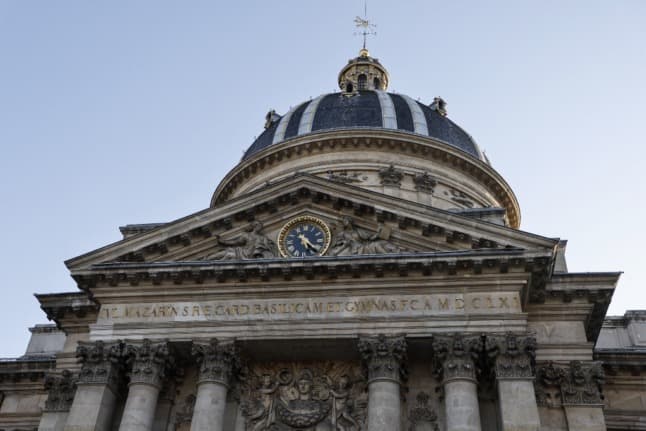French Academy fights government over English on ID cards

The Academy charged with defending the French language has taken aim at the latest encroachment of English - its appearance on the national ID card widely used for travel within the EU.
The latest versions of the laminated cards that were introduced last year have included English translations of the different data fields, like "surname" appearing in italics next to the French "Nom."
While the move appears intended to smooth passage across international borders for French citizens, the Academie Francaise - founded in 1635 under King Louis XIII to guard "pure" French - is ready to mount a constitutional challenge over it.
READ ALSO:
- Why are the French so protective of their language?
- Swords, immortality and wifi: 5 things to know about Académie française
"Who has decided to place French and English on an equal footing in this document?" asked Helene Carrere d'Encausse, the Academy's permanent secretary.
"An essential principle is being jeopardised," she told the conservative newspaper Le Figaro, recalling that the modern French constitution provides in Article 2 that "The language of the Republic shall be French".
There is a European regulation requiring the words "Identity Card" to be translated into at least one other EU language, but Brussels leaves translating the rest of the document up to member states.
German national ID cards include translations into both English and French, while even passports issued by Britain -- which quit the EU in 2020 -- offer French translations.
Complaining that the Academy's voice is no longer heard in public debate, the body has hired lawyers to write to Prime Minister Jean Castex, Le Figaro reported, "asking him to repeal the provision creating the new national ID card" -- so far without receiving a response.
If Castex's office fails to reply, the lawyers are preparing to take the case to the Conseil d'Etat, France's top administrative court.
Bruno Retailleau, leader of the conservative Republicans group in the French Senate, tweeted Friday that "the new card no longer really has a 'French identity'. Why is there such insistence on erasing the substance of our pride and our national unity?"
But speaking on broadcaster RMC, writer and musician Etienne Liebig asked, "Who are we French people to be so very afraid of losing our identity for reasons like this?"
Comments (4)
See Also
The latest versions of the laminated cards that were introduced last year have included English translations of the different data fields, like "surname" appearing in italics next to the French "Nom."
While the move appears intended to smooth passage across international borders for French citizens, the Academie Francaise - founded in 1635 under King Louis XIII to guard "pure" French - is ready to mount a constitutional challenge over it.
READ ALSO:
- Why are the French so protective of their language?
- Swords, immortality and wifi: 5 things to know about Académie française
"Who has decided to place French and English on an equal footing in this document?" asked Helene Carrere d'Encausse, the Academy's permanent secretary.
"An essential principle is being jeopardised," she told the conservative newspaper Le Figaro, recalling that the modern French constitution provides in Article 2 that "The language of the Republic shall be French".
There is a European regulation requiring the words "Identity Card" to be translated into at least one other EU language, but Brussels leaves translating the rest of the document up to member states.
German national ID cards include translations into both English and French, while even passports issued by Britain -- which quit the EU in 2020 -- offer French translations.
Complaining that the Academy's voice is no longer heard in public debate, the body has hired lawyers to write to Prime Minister Jean Castex, Le Figaro reported, "asking him to repeal the provision creating the new national ID card" -- so far without receiving a response.
If Castex's office fails to reply, the lawyers are preparing to take the case to the Conseil d'Etat, France's top administrative court.
Bruno Retailleau, leader of the conservative Republicans group in the French Senate, tweeted Friday that "the new card no longer really has a 'French identity'. Why is there such insistence on erasing the substance of our pride and our national unity?"
But speaking on broadcaster RMC, writer and musician Etienne Liebig asked, "Who are we French people to be so very afraid of losing our identity for reasons like this?"
Join the conversation in our comments section below. Share your own views and experience and if you have a question or suggestion for our journalists then email us at [email protected].
Please keep comments civil, constructive and on topic – and make sure to read our terms of use before getting involved.
Please log in here to leave a comment.